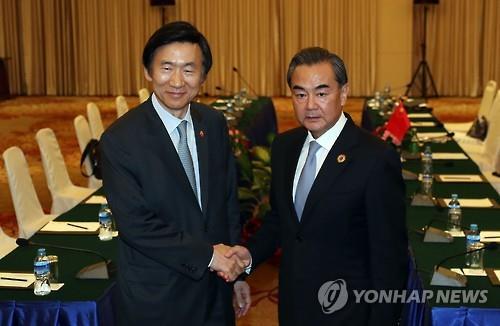China blamed South Korea on Sunday for hurting their trust by pushing to deploy an advanced missile system on the Korean Peninsula despite its strong opposition.
The remarks were made by Chinese Foreign Minister Wang Yi before starting talks with his South Korean counterpart, Yun Byung-se, on the sidelines of a regional security forum.
"The recent behavior from South Korea has undermined the foundation for our bilateral trust," Wang said through an interpreter, voicing his displeasure apparently with the joint decision by Seoul and Washington to place the Terminal High Altitude Area Defense system on the peninsula.
"Now I will hear what Minister Yun has to say. In particular, I will hear what kind of practical actions South Korea will take to protect the unwavering relations between us," he added.
The THAAD deployment decision announced earlier this month has drawn sharp criticism from China and Russia, which have objected to the move on worries that it could undermine its strategic security interests. South Korea has claimed that the missile interception system is designed only to counter the ever-growing nuclear and missile threats from North Korea.
Yun and Wang are currently in this Laotian capital of Vientiane to attend a series of meetings led by the Association of Southeast Asian Nations. They will also join the ASEAN Regional Forum to be attended by all member countries of the long-halted six-party talks aimed at ending the North's nuclear program.
 |
South Korea's Foreign Minister Yun Byung-se (left)takes hands with his Chinese counterpart Wang Yi before holding bilateral talks on the sidelines of ASEAN meetings on July 24, 2015. (Yonhap) |
Wang said that the bilateral talks held late at night came at the request of South Korea and China also agreed to the importance of communication between neighboring countries that have maintained cooperative ties in many areas.
China is South Korea's largest trading partner and a linchpin along with the U.S. in Seoul's push to enforce toughened sanctions on North Korea.
Yun acknowledged that there are challenges in relations between the two countries, but he still noted that their bilateral ties are based on trust in public and private sectors. He also played down the current challenges confronting the two, saying that they are not something that cannot be overcome.
He hoped that both countries will play a "major" role in maintaining peace and stability not just on the Korean Peninsula but also in the international community.
A government source close to the matter later played down Wang's unusually harsh word as nothing but a repeat of what China has said about THAAD. He said that Yun also reaffirmed South Korea's claim that it does not hurt Beijing's strategic security interests during the meeting held behind closed doors.
Speaking to a group of reporters, the official stressed that South Korea and China sould continue to communicate each other despite such a difference and that it is "meaningful" for both sides to share the consensus to keep talking going forward. (Yonhap)








